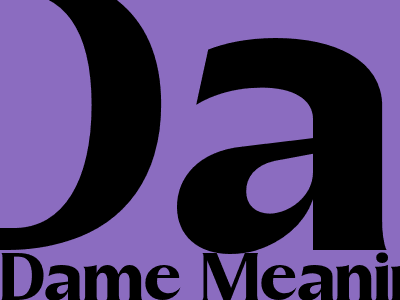Dame Meaning: Unveiling the Etymology and Evolution of a Title
Etymology:Tracing the Roots of "Dame"
The etymology of "dame" traces back to the Latin word "domina", signifying "lady" or "mistress". It emerged in Middle English as "dame", denoting a woman of high social rank or a married lady.
Evolution of the Term: Shifting Connotations
Middle Ages: Nobility and Respect
During the Middle Ages, "dame" held significant prestige, referring to noblewomen and wives of knights. It conveyed respect and deference, reflecting the social hierarchy of the time.
16th-18th Centuries: Extended Usage
In the 16th to 18th centuries, "dame" broadened in usage, becoming a more general term for any respectable married woman. It also became associated with elderly women, often used as a respectful address.
19th-20th Centuries: Modern Interpretation
In the 19th and 20th centuries, "dame" gained a more colloquial meaning, referring to an older woman, especially one with a strong and independent character. It also became a title bestowed upon women for their contributions to society.
"Dame" as an Honorific: Recognizing Achievements
Today, "dame" is primarily used as an honorific title awarded to women who have made outstanding contributions to their fields or society as a whole. It is the female equivalent of "sir" and is conferred by the British Monarch.
Examples of Notable Dames
- Dame Judi Dench: Acclaimed actress known for her roles in Shakespearean plays and the James Bond franchise.
- Dame Maggie Smith: Award-winning actress known for her work in Downton Abbey and Harry Potter.
- Dame Helen Mirren: Esteemed actress who has portrayed Queen Elizabeth II in several films.
Conclusion: The Enduring Legacy of "Dame"
The term "dame" has undergone a fascinating evolution over the centuries, from its origins as a title of nobility to its modern usage as an honorific. It serves as a testament to the changing roles and perceptions of women throughout history and continues to be a symbol of respect and distinction.

تعليقات